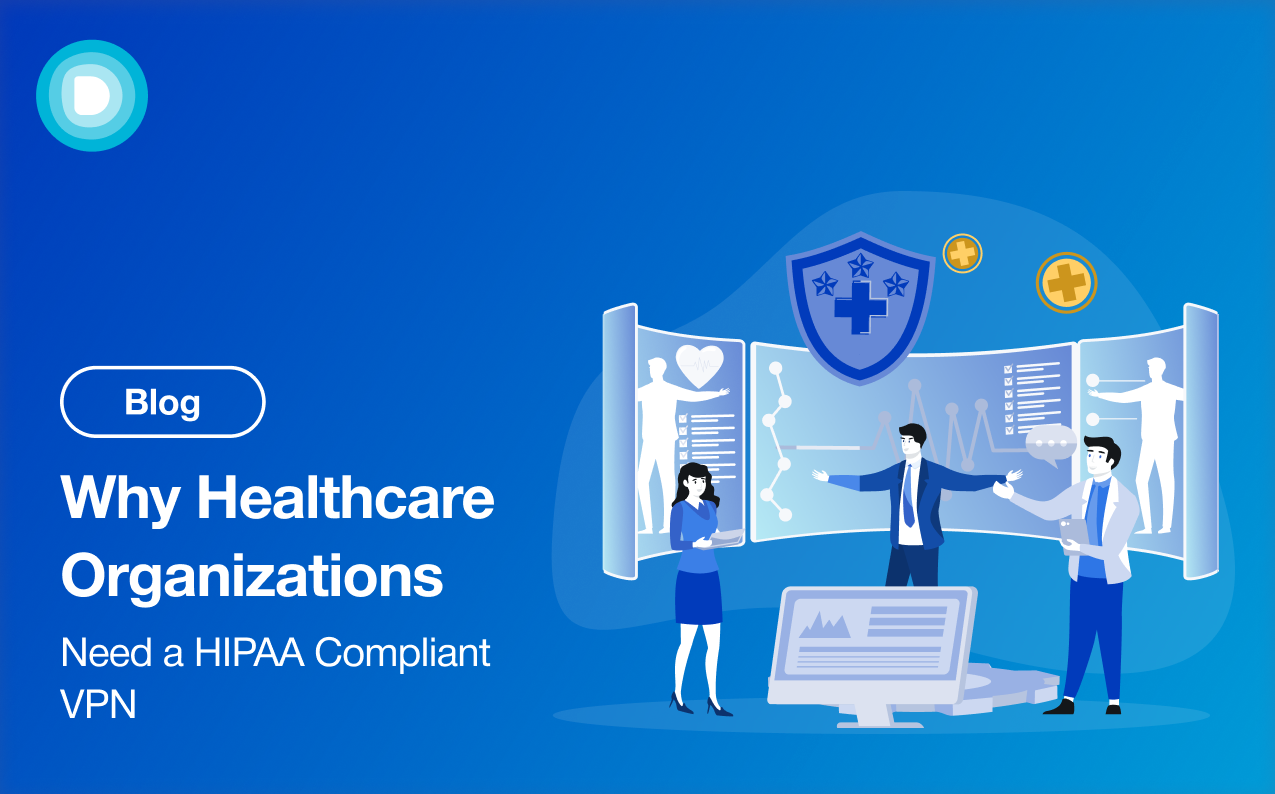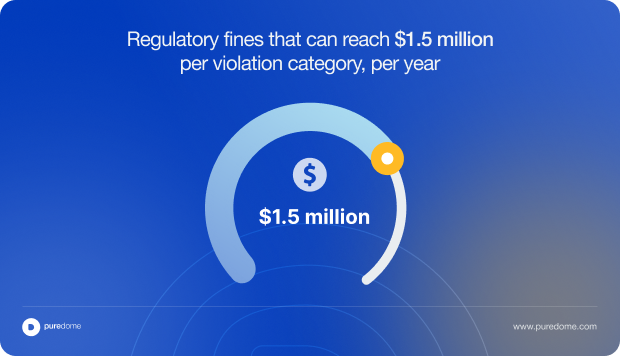- Product
-
Solution
-
By Industry
Cybersecurity solutions tailored to your industry’s needs.
-
- Resources
-
Books
Our ultimate guides and playbooks
Solution Briefs
Overview of PureDome’s functionality
-
Quizzes
Assess your cybersecurity readiness
Case Studies
PureDome customer success stories
Newsletter
Subscribe to the PureDome newsletter
-
- About Us
- Partner
- Pricing
- Download
Why Healthcare Organizations Need a HIPAA Compliant VPN
-
Aiman Ikram
-
26 May 2025
- 3 min read

Healthcare data breaches aren’t just a threat. They’re happening — constantly. In 2023 alone, the U.S. healthcare sector saw over 540 reported data breaches, affecting more than 112 million individuals. That’s not a random spike; it’s part of a growing pattern. As more patient care moves online, and more staff work remotely, the attack surface keeps widening.
And here's the kicker: 93% of healthcare organizations have experienced a data breach in the past three years, according to the Ponemon Institute. It’s no longer a question of if—it’s when. That’s where a HIPAA-compliant VPN steps in. Not as a fancy tool for IT, but as a daily necessity for keeping sensitive information safe and accessible.

The Healthcare Industry: A Prime Target for Cyber Attacks
Healthcare organizations are uniquely vulnerable. Not because they’re behind on tech (though some are), but because of what’s at stake. Medical records, insurance details, personal identifiers—all in one place. It’s a goldmine for cybercriminals.
And they know it. The average cost of a healthcare data breach is $10.93 million, the highest of any industry. Combine that with outdated infrastructure, staff stretched thin, and remote access from everywhere, and you’ve got a perfect storm. Hospitals and clinics don’t need more complexity—they need tools that actually reduce risk without slowing everything down.
So, What’s a HIPAA-Compliant VPN Anyway?
A HIPAA-Compliant is not just a VPN with a fancy label. HIPAA compliance means a very specific set of protections:
Data encryption during transmission
HIPAA requires that all Protected Health Information (PHI) is encrypted while being transmitted across networks. A compliant VPN must use strong encryption protocols (like AES-256) to ensure that sensitive data can't be intercepted or read by unauthorized parties.
Strict access controls and user authentication
Only authorized users should have access to PHI. A HIPAA-compliant VPN enforces this through features like role-based access, unique user IDs, and multi-factor authentication—preventing unauthorized entry into systems handling PHI.
Logging and monitoring of all activity
To detect and respond to unauthorized access or suspicious behavior, HIPAA mandates audit controls. This means the VPN must provide logs of who accessed what, when, and from where—supporting both security and compliance investigations.
If a VPN doesn’t have these, it’s not compliant. And using a non-compliant VPN in a healthcare setting? That’s a problem waiting to explode.
What to Look For in a HIPAA-Compliant VPN
You need a solution that works in real-world conditions—remote staff, mobile devices, unpredictable schedules. These features aren’t just “nice to have”—they’re the foundation:
- End-to-end encryption so data is secure, even over public Wi-Fi
- Multi-factor authentication (MFA) for access
- Role-based permissions to ensure people only access what they need
- Centralized management so IT can keep track of it all
Without these, you’re basically leaving the door cracked open and hoping no one walks in.
Read: HIPAA Compliance Checklist
Remote Work in Healthcare: A Growing Challenge
Remote work isn’t going anywhere. More than 46% of healthcare providers now offer telehealth services, and that number’s still climbing. From doctors conducting virtual visits to back-office staff processing claims from home, the modern healthcare workforce is increasingly decentralized.
And that’s great for flexibility—but risky for data. One unsecured Wi-Fi connection can compromise thousands of patient records. A HIPAA-compliant VPN secures these access points, encrypts every connection, and ensures your team can work securely, wherever they are.
Here’s a look at how different setups compare:
|
Access Method |
Security Risk Level |
HIPAA Compliant? |
Recommended for Healthcare? |
|
Home Wi-Fi (No VPN) |
High |
No |
Not recommended |
|
Public Wi-Fi (No VPN) |
Very High |
No |
Strongly discouraged |
|
Business VPN (Non-HIPAA) |
Medium |
Maybe not |
Risky without guarantees |
|
HIPAA-Compliant VPN (e.g., PureDome) |
Low |
Yes |
Ideal for secure access |
The Real Cost of Skipping Compliance
Let’s not sugarcoat it. Skipping a HIPAA-compliant VPN is risky business. You might save a few bucks upfront, but the costs of a breach are brutal. We’re talking:
- Regulatory fines that can reach $1.5 million per violation category, per year
- Lost patient trust that takes years (if ever) to recover
- Operational shutdowns and breach investigations that drain your resources
Healthcare isn’t just about care anymore—it’s about data protection, too.

Why PureDome Makes Sense for Healthcare Teams
You don’t want to worry if every remote login is a liability. That’s where PureDome comes in. It offers everything a HIPAA-compliant VPN should, but without the headache:
- Bank-grade encryption across all connections
- User and role-based access control
- Centralized management for your IT team
- Logs and monitoring that help keep you compliant
It’s designed to help you manage risk, simplify operations, and support secure work—on-site, at home, or anywhere else your team might be.
Read: ZTNA Implementation with PureDome
Wrapping It Up
Cyber threats in healthcare aren’t slowing down. Remote work isn’t either. That leaves you with one clear priority: secure the data, everywhere it goes. A HIPAA-compliant VPN isn’t a bonus feature—it’s a daily requirement.
With PureDome, you get security without the friction. You keep your team flexible, your operations moving, and your patient data exactly where it should be—protected.
Because in healthcare, protecting people starts with protecting their information.